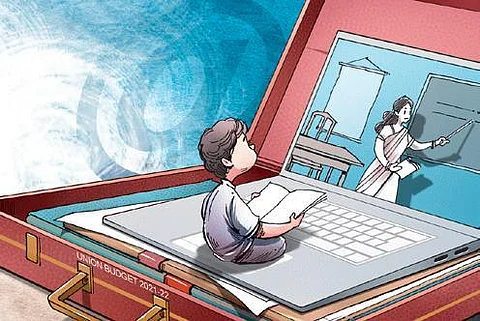

KOCHI: Life has been a rollercoaster ride for students over the past two years, with more than 18 months of their academic lives spent attending classes online. However, even as the students rejoined the schools and began their offline classes, they had to force themselves to re-acclimatise to a mode of teaching that they had been very comfortable with before the pandemic struck. The teachers and students are today battling the problem of the learning gap while trying to fit into the classroom atmosphere.

“Children becoming restless in the classroom is a fact,” said Sameer Siddiqui, a teacher. According to him, for nearly 18 months the students were attending the classes from the comfort of their homes. “There were no set rules and the children had a lot of freedom. However, all that vanished when they reached the school,” he said.
Covid restrictions also meant the cancellation of all extra-curricular activities, he added. “And this didn’t help much,” said Sameer. According to Shakeela S, a teacher, the only time they got to leave the classrooms was either to go to the toilets or have lunch. “Rest of the time the students remain confined to the four walls of the classrooms. Another reason behind the restlessness is the direct attention that they get from the teachers,” she said.
According to Shakeela, during online classes, students got a lot of help from their parents. “All that vanished once they came back to their classrooms. Here they had to interact with the teachers directly and felt very much constrained,” she said. Their shortcomings got revealed, she added. “This too made them very restless. During the online classes, the teachers had thought that the students were able to grasp all the facts and concepts being taught to them. However, all that belief got dispelled once we conducted tests in the offline mode,” said Shakeela.
“It was a nightmare. The students hadn’t grasped anything. So we had to start right from the beginning and give special coaching. Even then, things are not as good as they were in the pre-pandemic days,” she said. Sameer said, “To bridge the learning gap, the teachers are conducting special classes after school for the students besides turning into counsellors to help them with the emotional problems they are encountering while attending the offline classes.”
According to Shibi A, a teacher, only the bright students fared well during the online classes and they continued to perform in the offline classes. “Average and below-average students fared the worst,” she added. “These students only study when they get that personal attention from the teachers. They need the motivation to do better. And being a language teacher I understand the importance of talking face-to-face,” she said.
‘Restlessness due to habitual disorder’
The children become restless when they are forced to deviate from their habits. “It is a habitual disorder,” said Dileep Varkey, a child psychologist. According to him, for the past 18 months or so, online classes had become a habit for the child. “Everything, right from his reaction time to his atmosphere changed. They found themselves in a safe zone,” he added. “Even though they were attending the classes, they were only physically present. They were not learning. However, that changed when they began attending offline classes. From a multi-focus, they got transplanted into a single-focus environment. Now going back to online mode and then back to offline, will force them to change their habits yet again,” said Dileep.